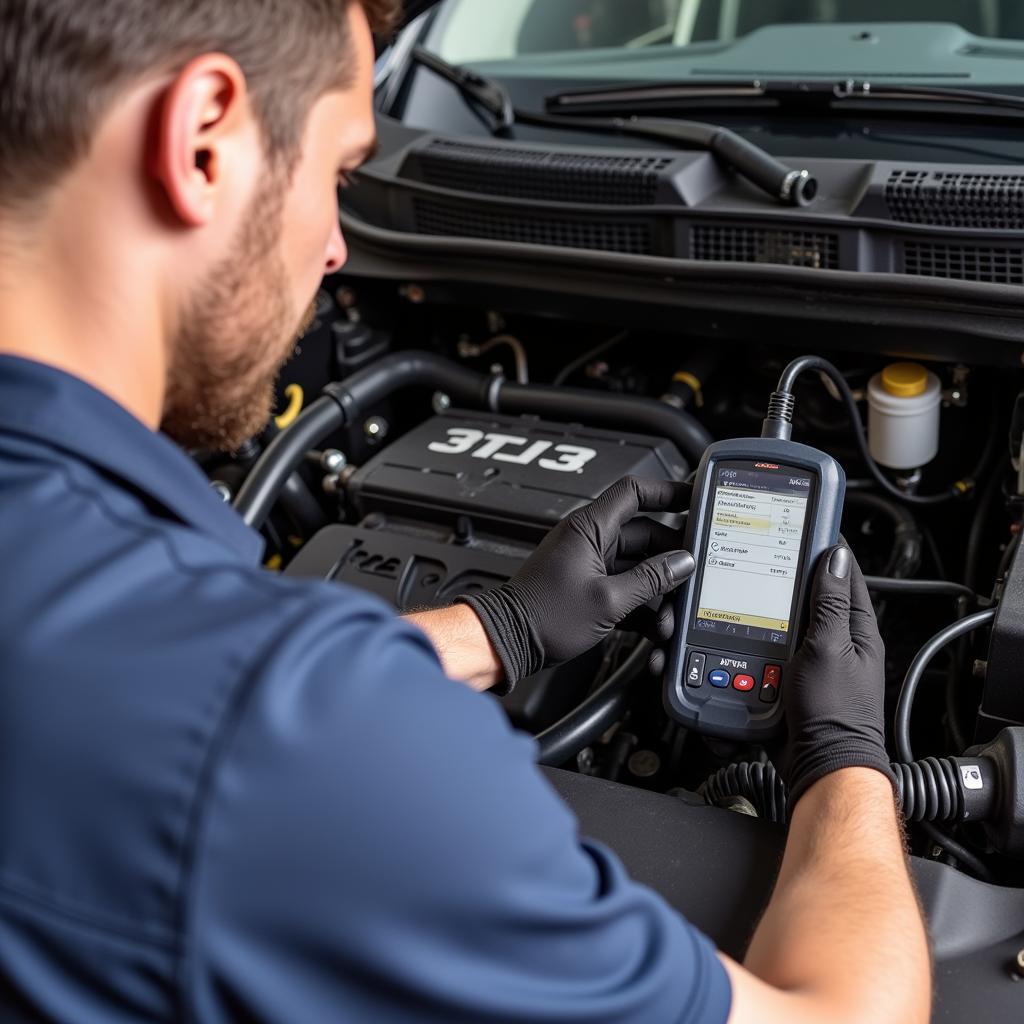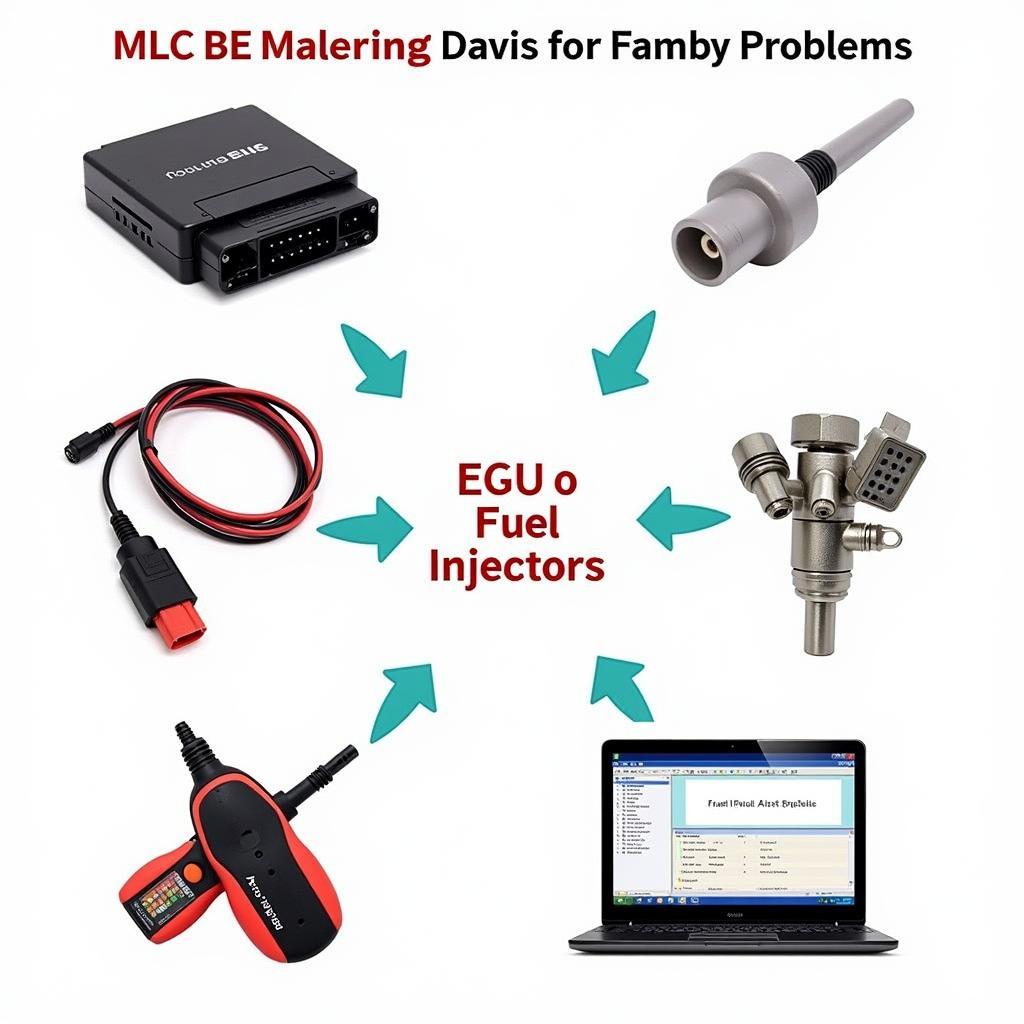Car Ecu Fuel Problems can be a real headache, leaving you stranded or with a hefty repair bill. This guide will delve into the common causes, symptoms, diagnostic procedures, and solutions for fuel-related issues stemming from your car’s Electronic Control Unit (ECU).
Understanding the Role of the ECU in Fuel Management
The ECU is the brain of your car’s engine management system. It controls various aspects, including fuel delivery, ignition timing, and emissions. It receives input from sensors throughout the engine and uses this data to adjust fuel injection parameters, ensuring optimal performance and fuel efficiency. When the ECU malfunctions or receives faulty data, it can lead to a range of fuel-related problems.
Common Symptoms of Car ECU Fuel Problems
Recognizing the symptoms of car ECU fuel problems is crucial for early diagnosis and preventing further damage. These symptoms can include:
- Poor Fuel Economy: Noticeably decreased mileage could indicate an ECU issue.
- Rough Idle: A shaky engine at idle can be a sign of incorrect fuel delivery.
- Hesitation or Stalling: Problems with acceleration or sudden engine stalls can be caused by ECU malfunctions.
- Check Engine Light: This warning light is often triggered by ECU-related problems, including fuel system issues.
- Hard Starting: Difficulty starting the car, especially when cold, can point towards a fuel delivery problem.
- Increased Emissions: A faulty ECU can disrupt the air-fuel mixture, leading to increased emissions.
Diagnosing Car ECU Fuel Problems
Pinpointing the source of the problem requires a systematic approach. Here’s a step-by-step guide:
- Check the Check Engine Light: Use an OBD-II scanner to retrieve the diagnostic trouble codes (DTCs) stored in the ECU. These codes provide valuable clues about the nature of the problem.
- Inspect Fuel System Components: Check for leaks, damaged fuel lines, or a clogged fuel filter. These issues can sometimes mimic ECU problems.
- Test Fuel Pressure: Ensure the fuel pump is delivering adequate pressure to the fuel injectors.
- Inspect Fuel Injectors: Test the injectors for proper operation and spray pattern. Clogged or faulty injectors can disrupt fuel delivery.
- Check ECU Wiring and Connectors: Look for damaged wires, loose connections, or corrosion that could interfere with communication between the ECU and other components.
 Inspecting Car ECU Fuel System Components
Inspecting Car ECU Fuel System Components
Solutions for Car ECU Fuel Problems
Once you’ve identified the cause, you can explore these solutions:
- ECU Repair or Replacement: If the ECU itself is faulty, it may need to be repaired or replaced. This is often the most expensive option, but it addresses the root cause.
- Software Update: Sometimes, a simple software update for the ECU can resolve the issue.
- Sensor Replacement: Faulty sensors can send incorrect data to the ECU, leading to fuel problems. Replacing the faulty sensor can restore proper function.
- Wiring Repair: Repairing damaged wiring or connectors can re-establish proper communication between the ECU and other components.
- Fuel System Component Replacement: Replacing faulty fuel system components, such as the fuel pump, fuel filter, or fuel injectors, can address the underlying issue.
 Solutions to Car ECU Fuel Problems
Solutions to Car ECU Fuel Problems
“A thorough diagnosis is key to fixing car ECU fuel problems. Don’t jump to conclusions without properly checking all related components,” advises John Miller, a seasoned automotive engineer with over 20 years of experience.
How Can I Tell if My Car Has an ECU Fuel Problem?
Look out for signs like reduced fuel economy, rough idling, hesitation, stalling, a check engine light, hard starting, and increased emissions.
What Should I Do if I Suspect an ECU Fuel Problem?
Start by using an OBD-II scanner to read trouble codes. Then, inspect fuel system components, test fuel pressure, and check the ECU wiring.
What Are the Common Causes of ECU Fuel Problems?
Common causes include faulty sensors, software glitches, damaged wiring, and a malfunctioning ECU itself.
Conclusion
Car ECU fuel problems can be complex, but with the right knowledge and diagnostic approach, they can be effectively resolved. By understanding the role of the ECU, recognizing the symptoms, and following the diagnostic steps outlined above, you can save yourself time and money. For expert assistance, connect with AutoTipPro at +1 (641) 206-8880 or visit our office at 500 N St Mary’s St, San Antonio, TX 78205, United States. Addressing car ECU fuel problems proactively ensures optimal engine performance, fuel efficiency, and a smoother driving experience.
FAQ
- Can a bad fuel pump cause ECU problems? While a bad fuel pump can cause similar symptoms, it doesn’t directly cause ECU problems. However, a failing fuel pump can sometimes trigger fault codes related to fuel delivery, which might be misinterpreted as ECU issues.
- How much does it cost to replace a car ECU? The cost can vary significantly depending on the car make and model, but it can range from a few hundred to over a thousand dollars.
- Can I drive with a faulty ECU? Driving with a faulty ECU is not recommended. It can lead to further damage, reduced performance, and potentially dangerous driving conditions.
- How do I prevent car ECU fuel problems? Regular maintenance, including timely replacement of fuel filters and addressing any sensor issues promptly, can help prevent ECU-related fuel problems.
- Is it difficult to diagnose car ECU fuel problems? While it can be complex, following a systematic diagnostic approach, as described in this guide, can make the process more manageable.
- Can I fix a car ECU fuel problem myself? Depending on the specific issue, some repairs, like sensor replacements, might be within the capabilities of a DIY enthusiast. However, more complex problems, like ECU repair or replacement, often require specialized knowledge and tools.
- What are the long-term effects of ignoring car ECU fuel problems? Ignoring these problems can lead to decreased fuel economy, increased emissions, engine damage, and potentially even complete engine failure.
“Regular maintenance and prompt attention to any warning signs can prevent many ECU-related issues,” adds Sarah Chen, an experienced automotive technician.




Leave a Reply